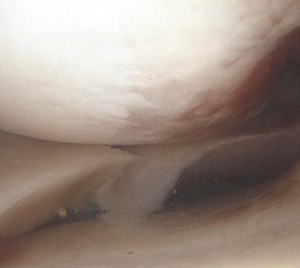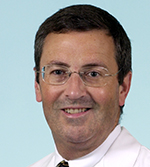Either physical therapy or arthroscopic surgery can relieve pain and improve mobility in patients with a torn meniscus and arthritis in the knee, according to researchers from Washington University School of Medicine in St. Louis and six other centers.

Their findings appear online in The New England Journal of Medicine.
“Patients can get better with physical therapy or surgery,” said Rick W. Wright, MD, a sports medicine specialist and one of the leaders of the study at Washington University. “After one year, the results were similar, and patients improved regardless of their treatment. But the results are not entirely clear because 30 percent of the patients assigned to physical therapy eventually had surgery because they felt like they were not improving adequately with physical therapy alone.”
Wright, the Dr. Asa C. and Mrs. Dorothy W. Jones Professor in Orthopaedic Surgery, was one of four Washington University sports medicine specialists to take part in the study. The lead investigators were at Harvard’s Brigham and Women’s Hospital in Boston. Other Washington University sports medicine specialists who were co-investigators in the study are Robert H. Brophy, MD, associate professor of orthopedic surgery; Matthew J. Matava, MD, professor of orthopedic surgery; and Matthew V. Smith, MD, assistant professor of orthopedic surgery.
The researchers followed 351 patients for 12 months and evaluated their pain and knee function at the start of the study and every three months thereafter.
Those who were randomly assigned to physical therapy were given the option of crossing over into the surgery group if the patient and doctor didn’t think therapy was helping. A total of 51 patients exercised that option.
Others who were randomized to surgery opted to switch to therapy, but only nine patients did so.
“The people who crossed over from surgery back to therapy probably went into the study thinking that they wanted to participate, but when the randomization picked surgery for them, perhaps they got a little nervous,” Wright said. “Or maybe their family and work schedules just wouldn’t allow them to stop everything to have a knee operation.”

Osteoarthritis is the most common knee disorder, affecting more than 9 million people in the United States. Meniscal tears also are common, affecting as many as 35 percent of people older than 50. Wright said with a problem as common as a torn meniscus in an arthritic knee, it’s important for doctors to know what treatment will work best, but he said this study shows that both approaches can be effective.
Wright and the other researchers are continuing to follow study patients to determine how their knees are doing at 18 months and at two years after surgery. They want to identify predictors that indicate which patients are most likely to benefit from surgery or physical therapy. But he said if a patient seems to prefer one treatment approach over the other, he’s likely to honor the patient’s wishes.
“You’re probably not doing any harm by trying physical therapy first,” he said. “And if it fails, then you may benefit from arthroscopic surgery.”
Funding for this research comes from the National Institute of Arthritis and Musculoskeletal and Skin Diseases (NIAMS) of the National Institutes of Health (NIH).
NIH grant numbers are R01AR055557, K24AR057827 and P60AR047782.
Katz JN, et al. Surgery versus physical therapy for a meniscal tear and osteoarthritis. The New England Journal of Medicine, published online March 19, 2013, at NEJM.org
DOI: 10.1056/NEJMoa131408
The study sites were Brigham and Women’s Hospital and Boston University, Boston; Washington University School of Medicine in St. Louis; Rush University, Chicago; Mayo Clinic, Rochester, MN; Cleveland Clinic; Hospital for Special Surgery, New York; and Vanderbilt University, Nashville.
Washington University School of Medicine’s 2,100 employed and volunteer faculty physicians also are the medical staff of Barnes-Jewish and St. Louis Children’s hospitals. The School of Medicine is one of the leading medical research, teaching and patient care institutions in the nation, currently ranked sixth in the nation by U.S. News & World Report. Through its affiliations with Barnes-Jewish and St. Louis Children’s hospitals, the School of Medicine is linked to BJC HealthCare.